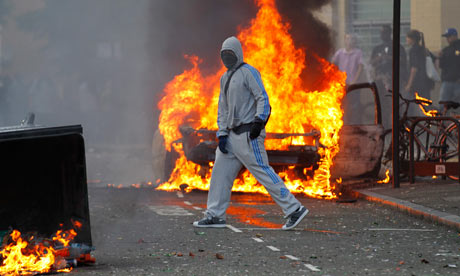
One year on from the riots, Metro asked four young people from Brixton-based youth-media hub, Live Magazine, for their take on what happened, what it’s like being a young person in double-dip recession Britain and their hopes for the future.
Reading their comments it's clear to see that there is a frustration about the way that the media portrays young people. Perhaps moving forward, there needs to be more variety in terms of the images and stories presented. Television and the media has such a huge impact on the forming of opinions and atttudes about certain groups within society so it is important that these images are accurate and reflect all sides. The media also has a huge influence in regards to challenging perceptions and the current perception of young people needs challenging now more than ever. It will be interesting to see, one year on from the London riots, whether these young voices will be heard.
Reposted from the Metro
‘The riots have shaped the way young people are perceived today, but many of these perceptions have existed for a very long time. The nation is constantly told young people lead lazy, easy lives, that we binge drink, we’re materialistic, our exams are easy and we’re self-destructive since we’re killing each other left right and centre. The riots engrained these perceptions even more.
'But here’s the thing, the majority of young people didn’t take part in the Riots. Why? Because despite these perceptions most of us are brilliant human beings doing great things for ourselves, we’re not all criminals.
'After 2011’s student protests and the riots, amongst many young people there’s been a determination to make our country better and give young people a voice. Young people are setting up social enterprises, despite being told everyday about the lack of jobs, students are striving to do well, while many are volunteering in their community as peer mentors and youth leaders.’
Zindzi Rocque Drayton, 22, Streatham, London – Features Editor, Live Magazine
‘Before the riots I was optimistically applying for work experience and jobs, eager to make use of my fresh English degree. But then the riots hit and nothing else mattered – I was addicted to the live coverage, but just as the intelligent discussions began, it all stopped.
'As the year progressed my hopes of a graduate job diminished as I was rejected from retail Christmas temp positions and with no paid work since graduating from university I signed on to Job Seekers Allowance – £30 of my weekly £50 went on travel so that I could work full time, unpaid, in the name of “experience”.
'Now it’s a year on and I have three jobs: two media positions are unpaid but I have swapped JSA for the glamour of retail work. But it’s almost as if the riots didn’t happen – rather than young people being helped, if anything young people seem to be suffering the most from cuts to services, benefits and paid opportunities.’
Christian Adofo, 23, Manor House, London – Sports Editor, Live Magazine
'The night the riots started I was getting ready to go out for a mate’s birthday when my brother showed me a picture of a burning police car on Twitter. I didn’t think much as disturbances in the area are common. However, as the disturbances spread to where family and friends lived, it became more real and the streets were eerie like the film 28 Days Later.
'Young people were portrayed in a negative manner and the images looped on TV didn’t dispel the stereotype and as a result young people have been blighted by the riots. The vast majority of young people are channelling their enthusiasm into something positive, yet the good work doesn’t get exposure.
'So I’ve become more politicised in response to the media and ruling classes making sweeping statements about young people and the riots. My message would be: we’re here, talk to us, listen to us so we can all learn from last summer and create something positive from the wreckage.’
Elias Wachenje, 13, Brixton, London – Writer, Live Magazine
‘When I left my house the day after the riots, reality hit – Brixton High Street was trashed, Foot Locker was burned out, Gamesmaster was smashed up and Currys was empty of all technology.
'How the riots were portrayed in the media annoyed me, it wasn’t just young people it was adults too. Yet the police, government, media and public blamed young people and turned us into the bogeyman.
'Now it’s summertime again and it’s important that young people go to youth projects and get off the streets during the holidays. The riots took place during the summer, when young people are bored, so we need to occupy our time productively. If I could speak to David Cameron I'd say, ‘Focus on this country’, because while youth clubs are closing and jobs become scarce, he spent £1.25bn in Libya.
'I hope the whole country is united through London 2012, gets behind Team GB and feels like they are part of it even if they don't have tickets.’

